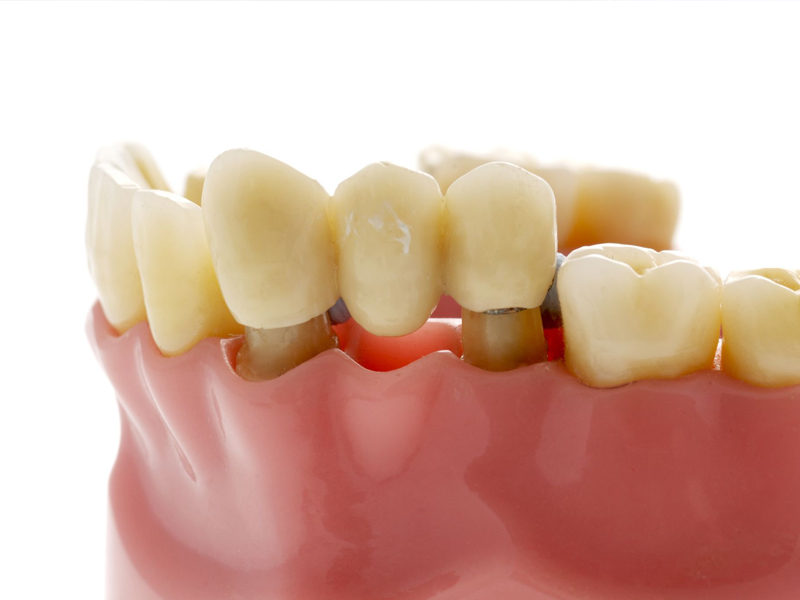Struggling with gaps in your smile? Seeking a solution to restore your confidence and oral health? Look no further than Sunstone Dental. Our expert team is dedicated to delivering top-quality dental care, including dental bridges. We believe in everyone’s right to a healthy, beautiful smile and combine advanced technology with personalized care to achieve outstanding results. Our mission is to help you regain your confidence and achieve optimal oral health. Don’t let missing teeth hold you back.
What are Dental Bridges?
Dental bridges are prosthetic devices designed to replace missing teeth by anchoring one or more artificial teeth (known as pontics) to adjacent natural teeth or dental implants. These adjacent teeth or implants serve as abutments, ensuring the bridge’s stability and support. Various types of dental bridges are available to meet specific needs, including traditional bridges, cantilever bridges, Maryland bridges, and implant-supported bridges. Each type comes with its own advantages and considerations, as discussed later in this guide. Beyond filling smile gaps, dental bridges offer numerous benefits, such as enhancing speaking and chewing abilities, preventing adjacent teeth from shifting, maintaining facial shape, and boosting self-confidence through smile restoration and improved oral health.
Types of Dental Bridges
- Traditional bridges: These are the most common type of dental bridges, supported by dental crowns on adjacent teeth or implants, providing a reliable and cost-effective option for tooth replacement.
- Cantilever bridges: Similar to traditional bridges but use just one adjacent tooth or implant for support, which may put more stress on the supporting tooth or implant.
- Maryland bridges: Also known as resin-bonded bridges, these are a less invasive alternative to traditional bridges, using a metal or porcelain framework bonded to adjacent teeth.
- Implant-supported bridges: These are the most stable and durable option, involving dental implants surgically placed in the jawbone to serve as artificial tooth roots, offering a secure and long-lasting solution for patients with multiple missing teeth or insufficient natural teeth for support.
Preparing for dental bridge treatment
Before undergoing a dental bridge procedure, your dentist will discuss treatment options, explain the process, and address any concerns. The first step involves preparing the abutment teeth or implants. For natural teeth, this includes reshaping them to fit dental crowns. For implants, they are surgically placed, followed by a healing period. After preparation, your dentist takes mouth impressions to guide the creation of your custom bridge at a dental laboratory, matching the colour, shape, and size of your natural teeth. During this period, you’ll wear a temporary bridge until your permanent one is ready.
How long do dental bridges last?
The lifespan of a dental bridge hinges on several factors, including its type, oral hygiene practices, and overall oral health. Traditional bridges usually last 5 to 15 years, while implant-supported bridges can endure a lifetime with proper care. To extend your bridge’s life, maintain good oral hygiene by brushing twice daily, daily flossing, and using antibacterial mouthwash. Regular dental check-ups and cleanings are essential for monitoring bridge and tooth health. Keep in mind that bridges may require repair or replacement due to accidents, decay, or issues with supporting teeth or implants. If problems arise, promptly contact your dentist for evaluation and necessary treatment.
Dental bridge care and maintenance
Proper care and maintenance are essential for the longevity and optimal functioning of your dental bridge. Follow these tips to keep it in great condition:
- Maintain Good Oral Hygiene: Brush your teeth at least twice daily with a soft-bristled toothbrush and fluoride toothpaste. Flossing between the bridge and adjacent teeth is crucial for removing plaque and food debris.
- Use a Bridge Threader or Floss Threader: These tools are helpful for cleaning under the bridge, reaching areas difficult to access with regular floss, ensuring thorough cleaning.
- Rinse with Antibacterial Mouthwash: Use an antibacterial mouthwash to kill bacteria and freshen your breath, preventing gum disease and maintaining bridge health.
- Avoid Sticky and Hard Foods: To prevent damage or loosening, steer clear of sticky or hard foods like ice, hard candies, and sticky snacks.
- Schedule Regular Dental Check-Ups: Regular dental check-ups are vital for monitoring the bridge’s health and that of the surrounding teeth. Your dentist will look for decay, damage, or issues with supporting teeth or implants. By following these care guidelines, your dental bridge will stay in excellent condition, ensuring a confident smile for years to come.
Book your appointment today
Dental bridges offer a reliable and aesthetically pleasing solution for replacing missing teeth. Whether you opt for a traditional bridge, implant-supported bridge, or another type, it’s essential to consult with a qualified dentist in Delta for the best choice. Take the first step towards restoring your smile, book an appointment today at Sunstone Dental by calling (604) 428-8722.

